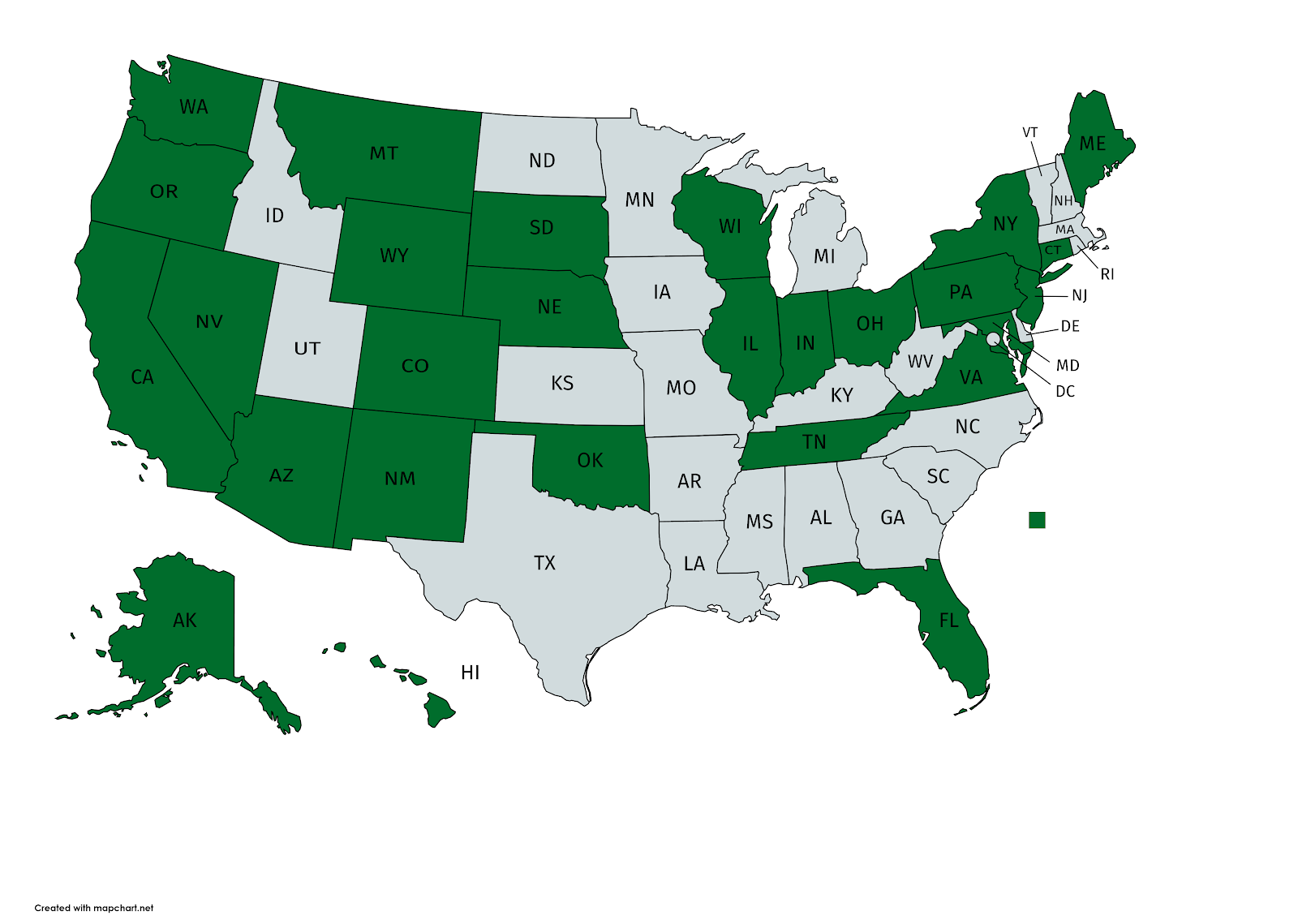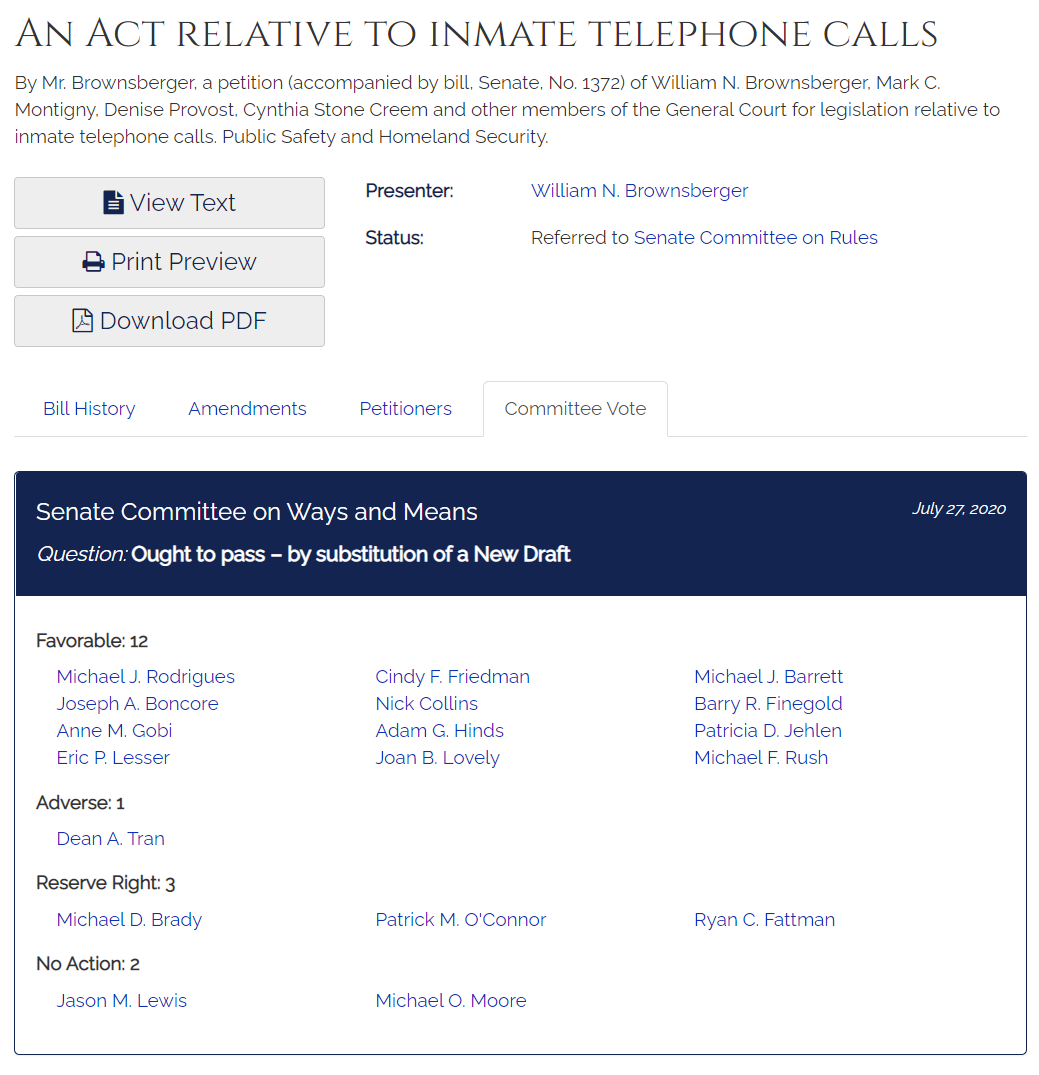What does the amendment do?
- It requires all committees to make their votes public on the website.
- It requires all testimony submitted to the committee to be made public.
- (chairs can grant exceptions for matters of "personal or confidential nature" like health issues if the person giving testimony requests in writing)
- It doesn't let committee chairs rush votes through committee in less than 24 hours.
- All Reps must have 24 hours in which to consider the text of the bill and whether they support it or not.
- The committee can take a vote to proceed faster if the matter is an emergency.
You can read the full language of our amendment here.
Because some committees are governed by the House Rules and others are governed by the Joint Rules, this will be a two-part amendment: one for the House rules, and another for the Joint rules.
How do we stack up to other states?
27 states make committee votes public on their legislature's website.

Why does it matter?
A lot of important progressive bills die in committee each session without a record of how they were voted on. Not only does important policy not get passed, but the public doesn't know who opposed them. If we know who votes against our interests, we could at least set up meetings with those Reps and seek common ground.
Here are some examples of bills that were killed in committee without a vote:
- 100% Renewable Energy: (killed without a vote in committee study orders twice 2018, and pending end of 2020)
- State-level Medicare-for-All (killed via study order 12 years in a row)
- Protections for immigrants - Safe Communities /Trust Act (killed via study order 8 years in a row)
- Strong Sex education laws - Healthy Youth Act (killed without a vote going back to 2012)
What are the arguments against this?
Over 13 Reps have already signed up to support this amendment, but we are hearing some arguments against it from various Reps. Below you'll find the most common arguments Reps have made against this amendment and ways to respond:
1. "My constituents wouldn't understand why I take certain votes. Policy is complicated, and you've got to trust me. You know I'm on your side!"
- Yes, we've actually heard this from some Reps. It's hard to believe, but some Reps don't think you're smart enough to understand how they are voting.
- We're sure our Reps have good reasons for taking the votes they do, which is why they should be comfortable having their votes public and confident in answering any questions their constituents might have.
- Asking to support these amendments doesn't imply that we mistrust reps! We want to be up front about what we expect to see changed.
2. "If anyone wants to know how I voted, they can call me and I'll tell them."
- That's great, but it's not enough. There are approximately 43,000 people in each State Rep district. Does each one of them need to call their rep's office to find out how they voted?
- If they're so willing to share, why not automate this process? It will cut down on requests and create greater transparency.
3. "All our votes are already public. My committee makes these votes public."
- A few committees have adopted rules to make their own votes public upon request. That is a great start, but again, why should all the residents of the Commonwealth need to send an email request to see how their Reps voted? 27 other states publish votes on their website. It's time for Massachusetts to join them.
4. "All our committee votes are already disclosed in the House Journal."
- This just isn't true. The House Journal shows only "dissents", which is an old, rarely used method for reps to indicate their disagreement with the committee's actions.
- When the Transportation committee voted to give a favorable report to the Work & Family Mobility Act, there were 14 legislators voting in favor, 4 legislators voting against, and two legislators who abstained (they "reserved their rights"). The Journal only showed 3 legislators' dissents. If you relied on the Journal, you wouldn't know that Sen. Tran had voted no and Reps. Tucker & Straus had reserved their rights.
- And the 3 reps who dissented? All three were conservative GOP Reps who wanted to be on the record opposing drivers' licenses for undocumented people. Since dissenting is optional, it's only the reps who are proud of their votes that willingly choose to go on the record. If they killed legislation that was popular in their district, they could vote No and just not dissent, saving themselves the publicity.
5. "I'm not sure if the State House website could display the votes in a format that would make sense."
- The MA Senate already displays committee votes in a clear and easy to read format. Here's an example:

6. "It would be too hard to put public testimony on the website, it would take staff too long."
- Most testimony is submitted in writing. It should be pretty easy to save those emails and documents as PDFs and to publish on the state house website. Committee staff already take notes for oral testimony, those notes could be made public or the proceedings could simply be recorded and posted to satisfy the requirement.
- During the summer of 2020, the House Ways & Means Committee posted all written testimony it had received on the Police Reform bill on July 17th and included all testimony submitted before about noon on that same day. Compiling email testimony does not take long.
7. "It wouldn't be safe to publish all testimony."
- It's clear to anyone giving testimony that their testimony is public. So everything that's in this testimony are things that people are comfortable stating publicly.
- Our rule also allows for chairs to make rules to restrict certain material of a "personal or confidential nature" to allow for people to testify about matters of a sensitive nature and feel secure in that (including domestic abuse or health issues)
8. "People would vote differently if it was public. In a recent session, the legislature was able to pass stronger gun control laws only because the committee vote was secret. The NRA would have attacked them and prevented the bill from getting out of committee if they had had to take a public vote."
- We are a representative democracy, and it's crucial for voters to know how their elected representatives are voting.
- In this example, the final vote for this bill on the floor was on the record, so every rep was on the record and subject to attacks from the NRA. In the following year, only 3 incumbent legislators out of 200 were defeated.
9. "We should leave this decision to each individual committee"
- We currently allow committees to make these decisions themselves and only 2 out of 29 committees provide for public committee votes clearly in their rules. There is no public discussion of committee rules for the public to weigh in on, so this would just be making the change harder.
- It's important to build a strong democracy for all committees to follow the same process here.
10. "I'll wait until the draft rules are out before making a decision."
- They don't need to wait because our proposal takes the current rules as the starting point, which is exactly what the temporary rules committee will do at the beginning of next year.
- The draft rules will only be public a few days before the vote, and it's likely to be in the middle of other important deadlines like the co-sponsorship deadline. Waiting only makes sure there won't be enough time to build support in the chamber to pass these changes.
Want to know who's signed on to Amendment 1? Find out at www.ActOnMass.org/the-campaign.
